Related Research Articles

Laurence Kerr Olivier, Baron Olivier was an English actor and director who, along with his contemporaries Ralph Richardson and John Gielgud, was one of a trio of male actors who dominated the British stage of the mid-20th century. He also worked in films throughout his career, playing more than fifty cinema roles. Late in his career he had considerable success in television roles.

Arms and the Man is a comedy by George Bernard Shaw, whose title comes from the opening words of Virgil's Aeneid, in Latin: Arma virumque cano.

Laurence Harvey was a Lithuanian actor and film director. He was born to Lithuanian Jewish parents and emigrated to South Africa at an early age, before later settling in the United Kingdom after World War II. In a career that spanned a quarter of a century, Harvey appeared in stage, film and television productions primarily in the United Kingdom and the United States.
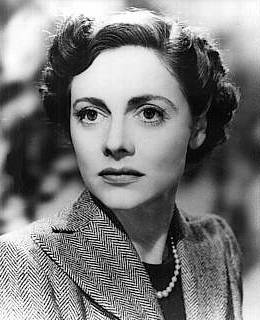
Dame Celia Elizabeth Johnson, was an English actress, whose career included stage, television and film. She is especially known for her roles in the films In Which We Serve (1942), This Happy Breed (1944), Brief Encounter (1945) and The Captain's Paradise (1953). For Brief Encounter, she was nominated for the Academy Award for Best Actress. A six-time BAFTA Award nominee, she won the BAFTA Award for Best Actress in a Supporting Role for The Prime of Miss Jean Brodie (1969).
Sir Ralph David Richardson was an English actor who, with John Gielgud and Laurence Olivier, was one of the trinity of male actors who dominated the British stage for much of the 20th century. He worked in films throughout most of his career, and played more than sixty cinema roles. From an artistic but not theatrical background, Richardson had no thought of a stage career until a production of Hamlet in Brighton inspired him to become an actor. He learned his craft in the 1920s with a touring company and later the Birmingham Repertory Theatre. In 1931 he joined the Old Vic, playing mostly Shakespearean roles. He led the company the following season, succeeding Gielgud, who had taught him much about stage technique. After he left the company, a series of leading roles took him to stardom in the West End and on Broadway.
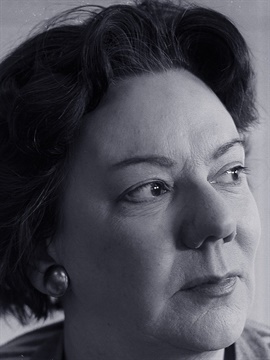
Dandy Nichols was an English actress best known for her role as Else Garnett, the long-suffering wife of the character Alf Garnett who was a parody of a working class Tory, in the BBC sitcom Till Death Us Do Part.

Sir Arthur John Gielgud, was an English actor and theatre director whose career spanned eight decades. With Ralph Richardson and Laurence Olivier, he was one of the trinity of actors who dominated the British stage for much of the 20th century. A member of the Terry family theatrical dynasty, he gained his first paid acting work as a junior member of his cousin Phyllis Neilson-Terry's company in 1922. After studying at the Royal Academy of Dramatic Art he worked in repertory theatre and in the West End before establishing himself at the Old Vic as an exponent of Shakespeare in 1929–31.

Kenneth Gilbert More, CBE was an English film and stage actor.
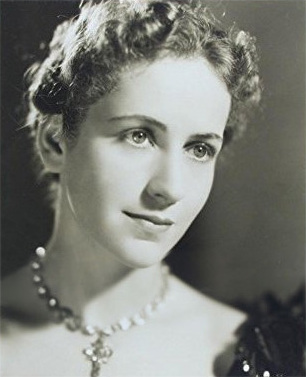
Dame Edith Margaret Emily Ashcroft, known professionally as Peggy Ashcroft, was an English actress whose career spanned more than 60 years.

The Theatre Royal Haymarket is a West End theatre on Haymarket in the City of Westminster which dates back to 1720, making it the third-oldest London playhouse still in use. Samuel Foote acquired the lease in 1747, and in 1766 he gained a royal patent to play legitimate drama in the summer months. The original building was a little further north in the same street. It has been at its current location since 1821, when it was redesigned by John Nash. It is a Grade I listed building, with a seating capacity of 888. The freehold of the theatre is owned by the Crown Estate.

John Edward Hawkins, CBE was an English actor who worked on stage and in film from the 1930s until the 1970s. One of the most popular British film stars of the 1950s, he was known for his portrayal of military men.

James Donald was a Scottish actor. Tall and thin, he specialised in playing authority figures, particularly military doctors.

Sir John Selby Clements, CBE was a British actor and producer who worked in theatre, television and film.

Irene Lilian Brodrick, Countess of Midleton was a British stage and screen actress of the 1930s, 1940s and 1950s and also a novelist.

Basil Sydney was an English stage and screen actor.

Sir Alec Guinness was an English actor. After an early career on the stage, Guinness was featured in several of the Ealing comedies, including Kind Hearts and Coronets (1949), in which he played nine different characters, The Lavender Hill Mob (1951), for which he received his first Academy Award nomination, and The Ladykillers (1955). He collaborated six times with director David Lean: Herbert Pocket in Great Expectations (1946), Fagin in Oliver Twist (1948), Col. Nicholson in The Bridge on the River Kwai (1957), for which he won both the Academy Award for Best Actor and the BAFTA Award for Best Actor, Prince Faisal in Lawrence of Arabia (1962), General Yevgraf Zhivago in Doctor Zhivago (1965), and Professor Godbole in A Passage to India (1984). In 1970, he played Jacob Marley's ghost in Ronald Neame's Scrooge. He also portrayed Obi-Wan Kenobi in George Lucas's original Star Wars trilogy; for the original 1977 film, he was nominated for Best Supporting Actor at the 50th Academy Awards.
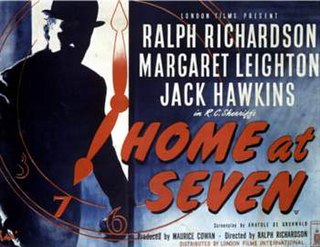
Home at Seven is a 1952 British mystery drama film directed by and starring Ralph Richardson. It also features Margaret Leighton, Jack Hawkins, Campbell Singer and Michael Shepley. It is based on the 1950 play Home at Seven by R. C. Sherriff. It was shot at Shepperton Studios with sets designed by the art directors Vincent Korda and Frederick Pusey. The film is Richardson's only work as director. Guy Hamilton was assistant director. It was released on DVD in the UK on 30 June 2014 by Network Distributing.
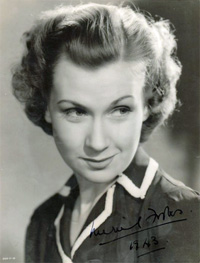
Meriel Forbes, Lady Richardson was an English actress. She was a granddaughter of Norman Forbes-Robertson and great-niece of Sir Johnston Forbes-Robertson. After making her stage debut with her father's touring company in 1929 she progressed via provincial repertory to the West End, where she appeared continually from the 1930s to the 1970s.

Sir Ralph Richardson (1902–1983) was an English actor who appeared on radio, film, television and stage. Described by The Guardian as "indisputably our most poetic actor", and by the director David Ayliff as "a natural actor ... [who] couldn't stop being a perfect actor", Richardson's career lasted over 50 years. He was—in the words of his biographer, Sheridan Morley—one "of the three great actor knights of the mid-twentieth century", alongside Laurence Olivier and John Gielgud.
ITV Sunday Night Theatre, originally titled ITV Saturday Night Theatre and often shortened to simply Sunday Night Theatre or Saturday Night Theatre, is a British television anthology series screened on ITV, whose episodes were contributed by various companies in the ITV network.
References
- ↑ Wearing, J. P. (16 September 2014). The London Stage 1950-1959: A Calendar of Productions, Performers, and Personnel. Rowman & Littlefield. ISBN 9780810893085 – via Google Books.
- ↑ "Home at Seven". Variety. 1 January 1952.
- ↑ "Home at Seven (1952) | BFI". Ftvdb.bfi.org.uk. Archived from the original on 13 January 2009. Retrieved 17 November 2016.